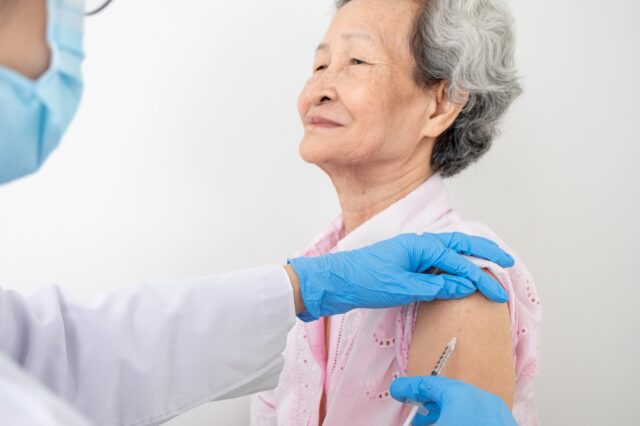Definition
Respiratory syncytial virus (RSV) is a very common virus that leads to mild, cold-like symptoms in adults and older healthy children. It can be more serious in young babies, especially those in certain high-risk groups.
Alternative Names
RSV; Palivizumab; Respiratory syncytial virus immune globulin; Bronchiolitis - RSV; URI - RSV; Upper respiratory illness - RSV; Bronchiolitis - RSV
Causes
RSV is the most common germ that causes lung and airway infections in infants and young children. Most infants have had this infection by age 2. Outbreaks of RSV infections most often begin in the fall and run into the spring.
The infection can occur in people of all ages. The virus spreads through tiny droplets that go into the air when a sick person blows their nose, coughs, or sneezes.
You can catch RSV if:
- A person with RSV sneezes, coughs, or blows their nose near you.
- You touch, kiss, or shake hands with someone who is infected by the virus.
- You touch your nose, eyes, or mouth after you have touched something contaminated by the virus, such as a toy or doorknob.
RSV often spreads quickly in crowded households and day care centers. The virus can live for a half an hour or more on hands. The virus can also live for up to 5 hours on countertops and for several hours on used tissues.
The following increase the risk for RSV:
-
Attending day care
-
Being near tobacco smoke
-
Having school-aged brothers or sisters
-
Living in crowded conditions
Symptoms
Symptoms can vary and differ with age:
- They usually appear 2 to 8 days after coming in contact with the virus.
- Older children most often have only mild, cold-like symptoms, such as a barking cough, stuffy nose, or low-grade fever.
Infants under age 1 may have more severe symptoms and often have the most trouble breathing:
Exams and Tests
Many hospitals and clinics can rapidly test for RSV using a sample of fluid taken from the nose with a cotton swab.
Treatment
Antibiotics and bronchodilators are not used to treat RSV.
Mild infections go away without treatment.
Infants and children with a severe RSV infection may be admitted to the hospital. Treatment will include:
- Supplemental oxygen
- Moist (humidified) air
- Suctioning of nasal secretions
- Fluids through a vein (by IV)
A breathing machine (ventilator) may be needed.
Outlook (Prognosis)
More severe RSV disease may occur in the following infants:
- Premature infants
- Infants with chronic lung disease
- Infants whose immune system does not work well
- Infants with certain forms of heart disease
Rarely, RSV infection can cause death in infants. However, this is unlikely if the child is seen by a health care provider in the early stages of the disease.
Children who have had RSV bronchiolitis may be more likely to develop asthma.
Possible Complications
In young children, RSV can cause:
When to Contact a Medical Professional
Call your provider right away if you have:
- Difficulty breathing
- High fever
- Shortness of breath
- Bluish skin color
Any breathing problems in an infant are an emergency. Seek medical help right away.
Prevention
To help prevent RSV infection, wash your hands often, especially before touching your baby. Make certain that other people, especially caregivers, take steps to avoid giving RSV to your baby.
The following simple steps can help protect your baby from getting sick:
- Insist that others wash their hands with warm water and soap before touching your baby.
- Have others avoid contact with the baby if they have a cold or fever. If necessary, have them wear a mask.
- Be aware that kissing the baby can spread RSV infection.
- Try to keep young children away from your baby. RSV is very common among young children and easily spreads from child to child.
- Do not smoke inside your house, car, or anywhere near your baby. Exposure to tobacco smoke increases the risk for RSV illness.
Parents of high-risk young infants should avoid crowds during outbreaks of RSV. Moderate-to-large outbreaks are often reported by local news sources to provide parents with an opportunity to avoid exposure.
The drug Synagis (palivizumab) is approved for the prevention of RSV disease in children younger than 24 months who are at high risk for serious RSV disease. Ask your provider if your child should receive this medicine.
References
Simões EAF, Bont L, Manzoni P, et al. Past, present and future approaches to the prevention and treatment of respiratory syncytial virus infection in children. Infect Dis Ther. 2018;7(1):87-120. PMID: 29470837 pubmed.ncbi.nlm.nih.gov/29470837/.
Smith DK, Seales S, Budzik C. Respiratory syncytial virus bronchiolitis in children. Am Fam Physician. 2017;95(2):94-99. PMID: 28084708 pubmed.ncbi.nlm.nih.gov/28084708/.
Talbot HK, Walsh EE. Respiratory syncytial virus. In: Goldman L, Schafer AI, eds. Goldman-Cecil Medicine. 26th ed. Philadelphia, PA: Elsevier; 2020:chap 338.
Walsh EE, Englund JA. Respiratory syncytial virus (RSV). In: Bennett JE, Dolin R, Blaser MJ, eds. Mandell, Douglas, and Bennett's Principles and Practice of Infectious Diseases. 9th ed. Philadelphia, PA: Elsevier; 2020:chap 158.

